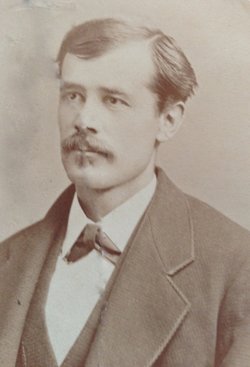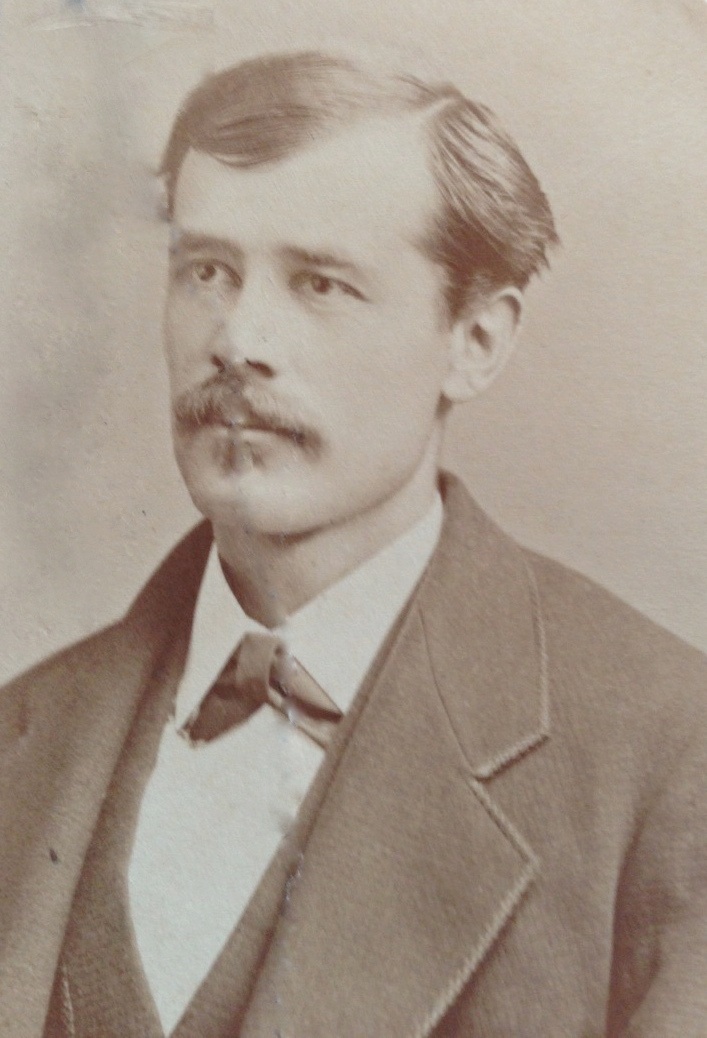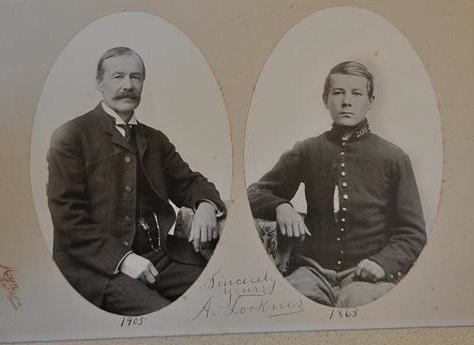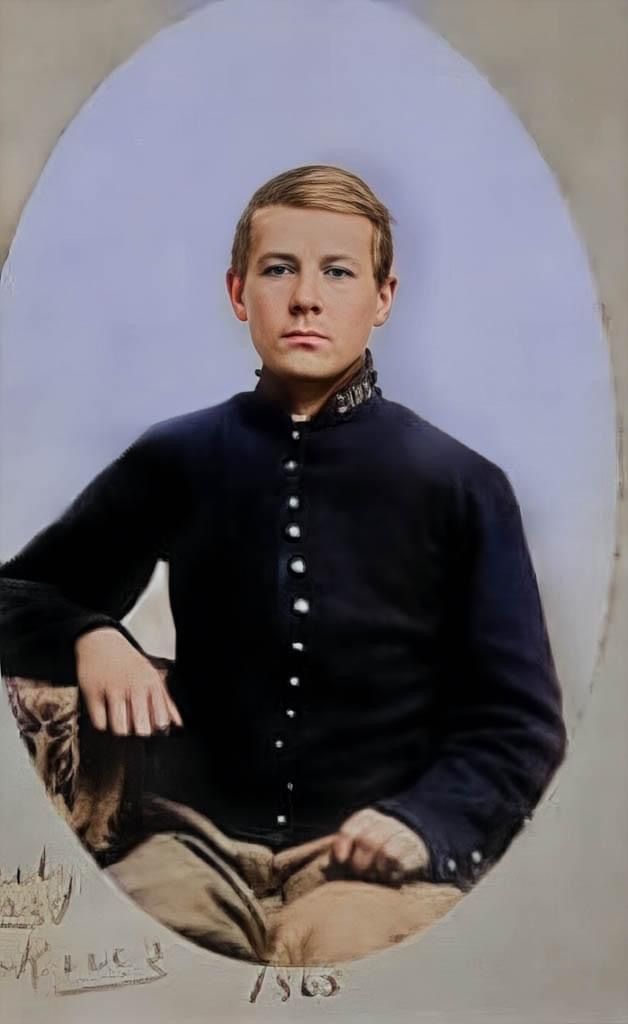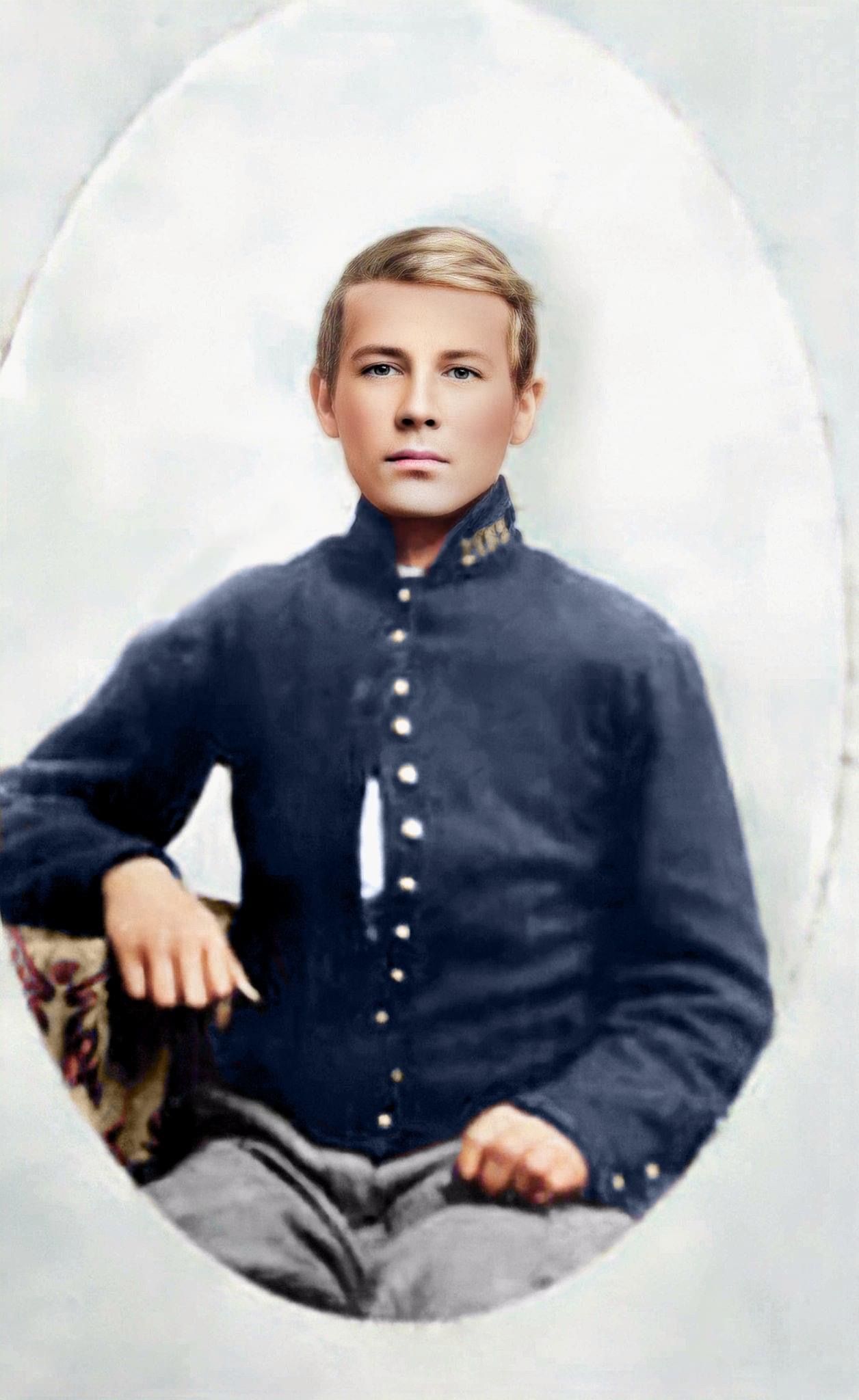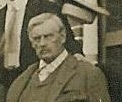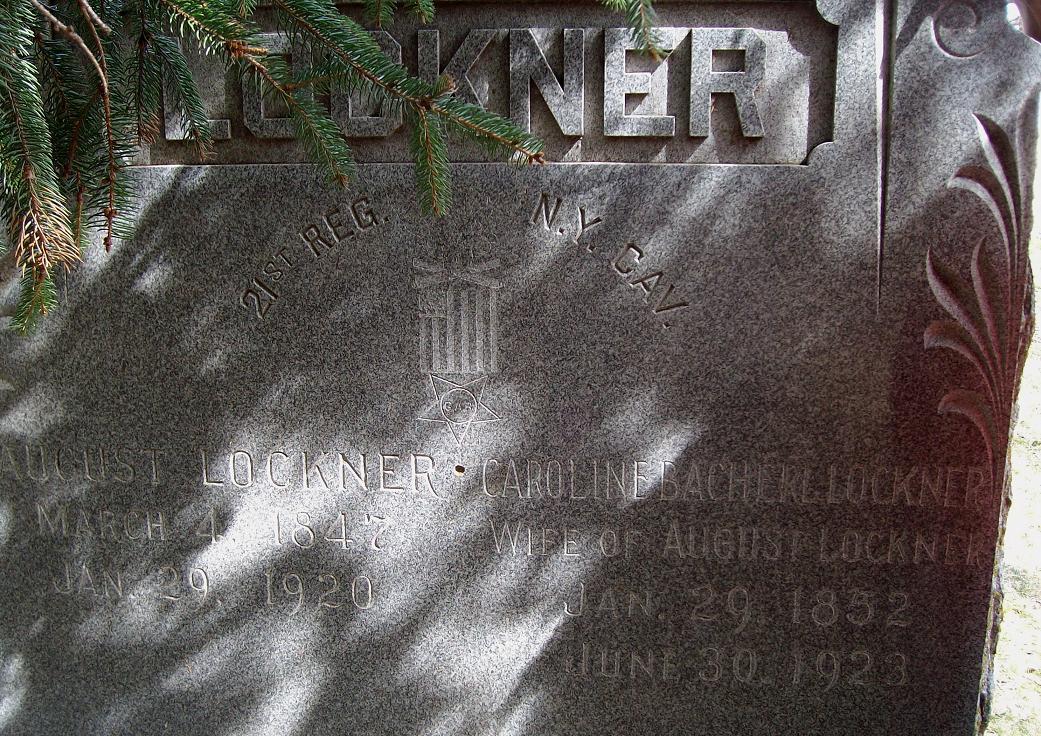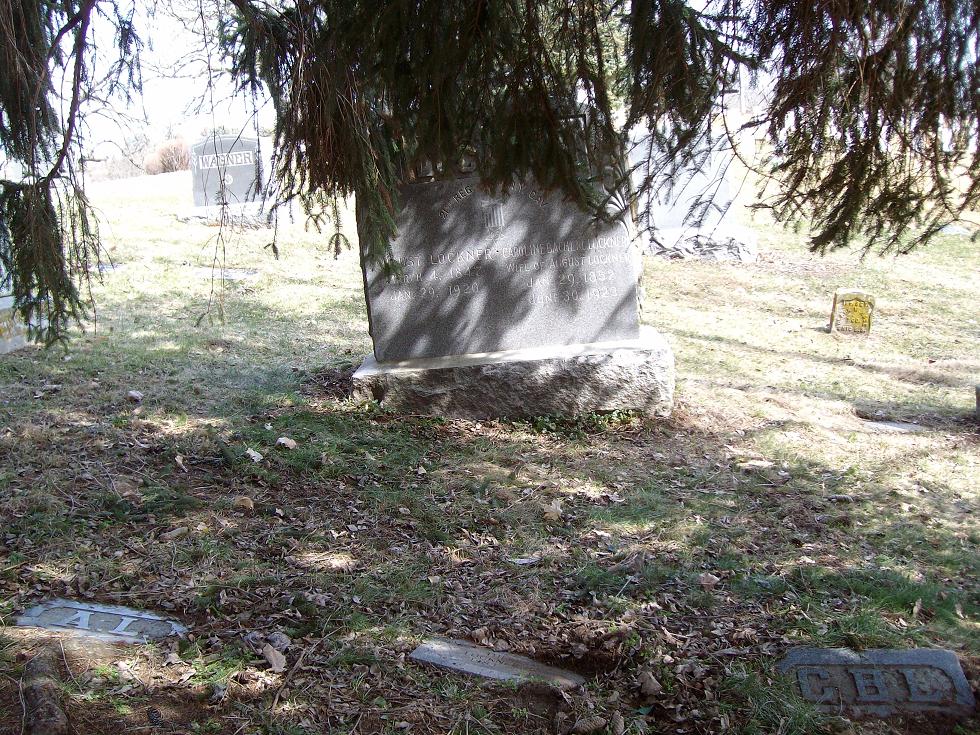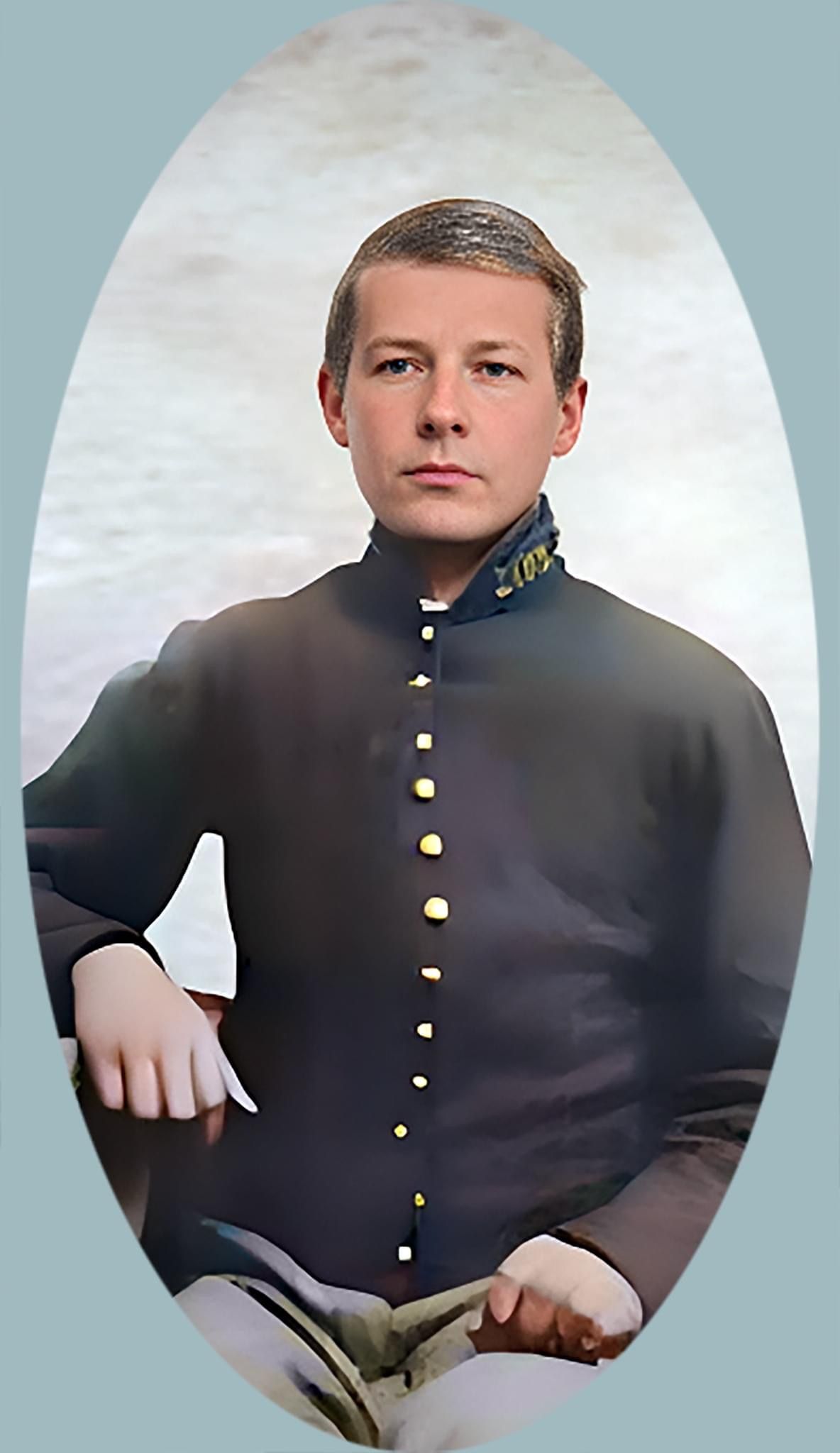OMAHA: THE GATE CITY and DOUGLAS COUNTY NEBRASKA
A Record of Settlement, Organization, Progress and Achievement
ILLUSTRATED
VOLUME II
Chicago .-
THE S. J. CLARKE PUBLISHING COMPANY 1917
Augustus Lockner, now living retired from business in Omaha, was born in Baden, Germany, March 4, 1847, and was reared in Rochester, New York. There he spent the period of his early boyhood and youth and on the lOth of August, 1863, when but sixteen years of age, he enlisted from Rochester for service in the Civil war under Captain James S. Graham. At the time of his enlistment he was the youngest member of his command. He joined the array as a private but was promoted to the rank of corporal over many of his com- rades who were much older. During the war he was captured by Mosby's Guer- rillas and was taken in charge by a man whose name was Lewis Powell and who told him while they were on the way that the south would win even if it had to kill the head of the government. Imagine Mr. Lockner's surprise when he saw the papers telling of President Lincoln's assassination and upon seeing the picture of "Payne," who attempted the life of Secretary Seward, recognized him as his escort, Powell.
Mr. Lockner first came to Omaha in 1865 as a member of Company H of the Twenty-first New York Volunteer Cavalry, which was detailed to accom- pany General Dodge across the plains on the trip which he made for the pur- pose of locating the best route for the Union Pacific Railway across the Rocky mountains. With this command Mr. Lockner traveled all over the west and had no serious trouble with the Indians. Later the company was detailed for provost guard duty in Denver City at a time when horse thieves and gamblers infested that place.
After receiving an honorable discharge from the army he homesteaded in the Platte valley across from Columbus, Nebraska, at which time there were only fifteen settlers in Butler county. He still owns that property and there has never been a dollar's indebtedness against it. He may well be proud of the fact that he still has this farm, which is one of the best in the state and which has been in his possession for half a century. He has owned a number of other tracts of land which he has obtained with patents granted by the government and his judicious investments in real estate have added materially to his income. In those early days the railroad company burned wood and Mr. Lockner cut wood for the company on the islands and furnished it to the road at Columbus. On one occasion two men, Grant and Wilson, who were old neighbors, got into an argument in his wood yard at Columbus and Wilson shot and killed Grant, after which he was hung by the enraged citizens. At that time Nebraska was a wild western frontier state. The Sioux Indians manifested hostility toward the white race but the Pawnees were friendly although they were inveterate beggars. During that period the Lockners were one of four or five families who took turns m going to Columbus for mail. Mr. Lockner had a homemade boat constructed of rough lumber and on one occasion when it was his turn to go for the mail another man by the name of John Patchen wished to go with him. Their boat sprang a leak, tilled rapidly with water, and sank with them, but Mr. Lockner, who was an excellent swimmer, saved Mr. Patchen from drowning. Prairie fires occurred at times and would rage for days. On one occasion Mr. Lockner saw smoke off against the sky line and watching its progress he prepared for the tire by back plowing, but tumbling weeds afire car- ried the blaze across the plowed ground and set fire to his tract of land. His log cabin was saved by his wife pumping water which he threw on the flames. His cattle corral, his granary, his oats, his wheat, one thousand bushels of grain, sixty tons of hay, his wagons, harness and farm machinery were all destroyed, but he managed to save his dwelling and also thirty head of cattle, which he rescued by driving them into a field of corn which saved them. The next year, 1872, Mr. Lockner rented his place.
He afterward went to Columbus and embarked in the hardware and imple- ment business, in which he there continued for nine or ten years and then dis- posed of his stock, removing to Omaha in 1882. Here he invested in property and has since dealt in real estate. He erected a flat building on North Sixteenth street, paying thirteen thousand dollars for a lot with a sixty foot frontage. The structure which he built is two stories in height, having stores on the first floor with flats above and is located at Nos. 1138 and 1140 North Sixteenth street. He also built two cottages, one on North Sixteenth street and one on North Seventeenth street, and he has much other property in Omaha, from which he derives a good rental. He also owns two farms which add materially to his income and at the present time he is living retired from active business, enjoy- ing in well earned rest the fruits of his former toil.
After getting his farm in shape so that it had become a paying property Mr. Lockner was married in March, 1870, to Miss Caroline Bacherl, of Bavaria, Germany. Her father, Franz Z. Bacherl, was a professor of languages and music, who, coming to this country, started for California, but when he reached the Union Pacific Railroad he stopped and opened a school in Columbus, Nebraska. It was thus that the family became residents of Nebraska and Mrs. Lockner formed the acquaintance of him who sought her hand in marriage. They became the parents of two children : Augustus J., who died at the age of twenty-one years; and Theresa J., the wife of R. N. Howes, of Omaha, by whom she has two children, Roland Lockner and Helen Theresa. Mrs. Lockner was always an able helpmate of her husband in pioneer times.
Mr. Lockner has never ceased to feel a deep interest in military affairs since he became a defender of the Union in the dark days of the Civil war. He was one of the originators of the first militia regiment of Nebraska, which was formed during the riots here, and he served as lieutenant of his company. He has been an exemplary representative of Masonry since 1874 and is now a member of St. John's Lodge of Omaha. He also became one of the charter members of the Nebraska Pioneers, of which he served as treasurer for six years, while in the year 19 14 he was the president. He likewise belongs to the Grand Army of the Republic and has filled all the chairs in Custer Post. He has taken an active interest in many projects which have worked for the development and up building of the state. He was one of the men who organized the Volunteer Fire Department at Columbus, Nebraska, of which he became the chief, and while in Columbus he served for three terms as a member of the city council, during which time he was made chairman of the building committee that had charge of the construction of the waterworks there. In politics Mr. Lockner has ever been an earnest and active republican and in 1892 he was the successful candidate for the office of representative to the state legislature. He served as the chairman of committees and was the originator of a bill to assist Nebraska soldiers who served in the Indian wars. The purpose of this bill was to find those who had rendered such service, no record having been previously kept, and to recognize and pay them for the aid which they had given. It will thus be seen that in many connections Mr. Lockner has contributed to the development and progress of city and state since he arrived in Omaha more than a half century ago. His memory forms a connecting link between the primitive past and the progressive present and his reminiscences of the early days are most interesting.
OMAHA: THE GATE CITY and DOUGLAS COUNTY NEBRASKA
A Record of Settlement, Organization, Progress and Achievement
ILLUSTRATED
VOLUME II
Chicago .-
THE S. J. CLARKE PUBLISHING COMPANY 1917
Augustus Lockner, now living retired from business in Omaha, was born in Baden, Germany, March 4, 1847, and was reared in Rochester, New York. There he spent the period of his early boyhood and youth and on the lOth of August, 1863, when but sixteen years of age, he enlisted from Rochester for service in the Civil war under Captain James S. Graham. At the time of his enlistment he was the youngest member of his command. He joined the array as a private but was promoted to the rank of corporal over many of his com- rades who were much older. During the war he was captured by Mosby's Guer- rillas and was taken in charge by a man whose name was Lewis Powell and who told him while they were on the way that the south would win even if it had to kill the head of the government. Imagine Mr. Lockner's surprise when he saw the papers telling of President Lincoln's assassination and upon seeing the picture of "Payne," who attempted the life of Secretary Seward, recognized him as his escort, Powell.
Mr. Lockner first came to Omaha in 1865 as a member of Company H of the Twenty-first New York Volunteer Cavalry, which was detailed to accom- pany General Dodge across the plains on the trip which he made for the pur- pose of locating the best route for the Union Pacific Railway across the Rocky mountains. With this command Mr. Lockner traveled all over the west and had no serious trouble with the Indians. Later the company was detailed for provost guard duty in Denver City at a time when horse thieves and gamblers infested that place.
After receiving an honorable discharge from the army he homesteaded in the Platte valley across from Columbus, Nebraska, at which time there were only fifteen settlers in Butler county. He still owns that property and there has never been a dollar's indebtedness against it. He may well be proud of the fact that he still has this farm, which is one of the best in the state and which has been in his possession for half a century. He has owned a number of other tracts of land which he has obtained with patents granted by the government and his judicious investments in real estate have added materially to his income. In those early days the railroad company burned wood and Mr. Lockner cut wood for the company on the islands and furnished it to the road at Columbus. On one occasion two men, Grant and Wilson, who were old neighbors, got into an argument in his wood yard at Columbus and Wilson shot and killed Grant, after which he was hung by the enraged citizens. At that time Nebraska was a wild western frontier state. The Sioux Indians manifested hostility toward the white race but the Pawnees were friendly although they were inveterate beggars. During that period the Lockners were one of four or five families who took turns m going to Columbus for mail. Mr. Lockner had a homemade boat constructed of rough lumber and on one occasion when it was his turn to go for the mail another man by the name of John Patchen wished to go with him. Their boat sprang a leak, tilled rapidly with water, and sank with them, but Mr. Lockner, who was an excellent swimmer, saved Mr. Patchen from drowning. Prairie fires occurred at times and would rage for days. On one occasion Mr. Lockner saw smoke off against the sky line and watching its progress he prepared for the tire by back plowing, but tumbling weeds afire car- ried the blaze across the plowed ground and set fire to his tract of land. His log cabin was saved by his wife pumping water which he threw on the flames. His cattle corral, his granary, his oats, his wheat, one thousand bushels of grain, sixty tons of hay, his wagons, harness and farm machinery were all destroyed, but he managed to save his dwelling and also thirty head of cattle, which he rescued by driving them into a field of corn which saved them. The next year, 1872, Mr. Lockner rented his place.
He afterward went to Columbus and embarked in the hardware and imple- ment business, in which he there continued for nine or ten years and then dis- posed of his stock, removing to Omaha in 1882. Here he invested in property and has since dealt in real estate. He erected a flat building on North Sixteenth street, paying thirteen thousand dollars for a lot with a sixty foot frontage. The structure which he built is two stories in height, having stores on the first floor with flats above and is located at Nos. 1138 and 1140 North Sixteenth street. He also built two cottages, one on North Sixteenth street and one on North Seventeenth street, and he has much other property in Omaha, from which he derives a good rental. He also owns two farms which add materially to his income and at the present time he is living retired from active business, enjoy- ing in well earned rest the fruits of his former toil.
After getting his farm in shape so that it had become a paying property Mr. Lockner was married in March, 1870, to Miss Caroline Bacherl, of Bavaria, Germany. Her father, Franz Z. Bacherl, was a professor of languages and music, who, coming to this country, started for California, but when he reached the Union Pacific Railroad he stopped and opened a school in Columbus, Nebraska. It was thus that the family became residents of Nebraska and Mrs. Lockner formed the acquaintance of him who sought her hand in marriage. They became the parents of two children : Augustus J., who died at the age of twenty-one years; and Theresa J., the wife of R. N. Howes, of Omaha, by whom she has two children, Roland Lockner and Helen Theresa. Mrs. Lockner was always an able helpmate of her husband in pioneer times.
Mr. Lockner has never ceased to feel a deep interest in military affairs since he became a defender of the Union in the dark days of the Civil war. He was one of the originators of the first militia regiment of Nebraska, which was formed during the riots here, and he served as lieutenant of his company. He has been an exemplary representative of Masonry since 1874 and is now a member of St. John's Lodge of Omaha. He also became one of the charter members of the Nebraska Pioneers, of which he served as treasurer for six years, while in the year 19 14 he was the president. He likewise belongs to the Grand Army of the Republic and has filled all the chairs in Custer Post. He has taken an active interest in many projects which have worked for the development and up building of the state. He was one of the men who organized the Volunteer Fire Department at Columbus, Nebraska, of which he became the chief, and while in Columbus he served for three terms as a member of the city council, during which time he was made chairman of the building committee that had charge of the construction of the waterworks there. In politics Mr. Lockner has ever been an earnest and active republican and in 1892 he was the successful candidate for the office of representative to the state legislature. He served as the chairman of committees and was the originator of a bill to assist Nebraska soldiers who served in the Indian wars. The purpose of this bill was to find those who had rendered such service, no record having been previously kept, and to recognize and pay them for the aid which they had given. It will thus be seen that in many connections Mr. Lockner has contributed to the development and progress of city and state since he arrived in Omaha more than a half century ago. His memory forms a connecting link between the primitive past and the progressive present and his reminiscences of the early days are most interesting.
Family Members
Sponsored by Ancestry
Advertisement
Records on Ancestry
Advertisement
